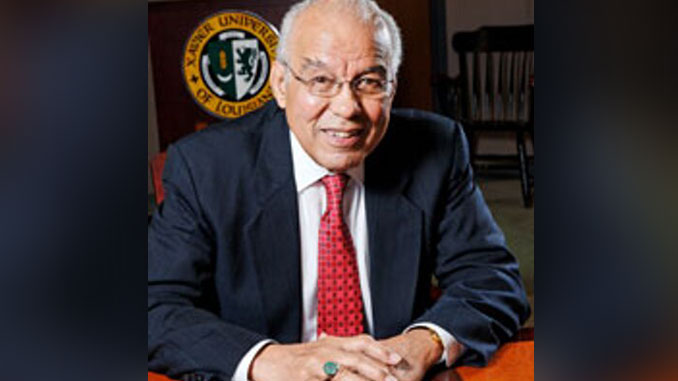
Xavier University
Norman C. Francis, longtime beloved president of Xavier University of Louisiana, will receive the University of Notre Dame’s 2019 Laetare Medal — the oldest and most prestigious honor given to American Catholics — at Notre Dame’s 174th University Commencement Ceremony on May 19 (Sunday).
“For more than 50 years, Dr. Francis has been at the center of civil rights advocacy by leveraging the power of Catholic higher education,” said Notre Dame President Rev. John I. Jenkins, C.S.C. “In bestowing the Laetare Medal upon him, Notre Dame recognizes his leadership in the fight for social justice through educational empowerment.”
During Francis’ 47-year tenure as president, Xavier’s enrollment nearly tripled, the endowment grew eightfold and the university became the leading producer of African-American undergraduates who complete medical school. Xavier also ranks first nationally in the number of African-American students earning undergraduate degrees in biology and life sciences, chemistry, physics and pharmacy.
At a time when the U.S. Supreme Court — based on a legal challenge to Louisiana law regarding “separate but equal” — upheld segregation as the law of the land, St. Katharine Drexel founded Xavier, America’s only historically black and Catholic university, in 1925. Heir to a banking fortune, Drexel also founded the Sisters of the Blessed Sacrament and used her entire inheritance to advance racial equality for African-Americans and Native Americans, especially through education. Drexel’s influence permeates Francis’ achievements.
“I did not build Xavier; I was part of Katharine Drexel’s mission to provide a quality education for all,” Francis said. “All the people I worked with were part of this plan and mission, which was not only honorable, but was totally necessary when you look back at what the United States was at the time.”
Born in Lafayette, Louisiana, in 1931, Francis was one of five children, and his early education took place in Catholic schools run by Spiritan priests and Sisters of the Blessed Sacrament — all funded by Drexel’s philanthropy during a time when American Catholic churches were segregated.
In 1952, Francis became the first African-American admitted to Loyola University Law School in New Orleans. As he put it, “Somebody had to break the color line.” Francis was not the only member of his family to push color lines. His older brother, the Most Reverend Joseph Francis, auxiliary bishop of Newark, became the fourth African-American to be elevated to the bishopric in the United States.
After earning his law degree, Francis served in the U.S. Army, after which he decided to forgo a promising legal practice for a career in higher education and became dean of men at Xavier in 1957.
“It didn’t take long for me to see that I could do more good educating young African-Americans, and when I look at the stats and where we are nationally, I never regretted it,” Francis said.
Francis accepted the offer to become the first lay African-American president of Xavier on April 4, 1968 — the same day Rev. Martin Luther King Jr. was assassinated.
“I am honored by Notre Dame recognizing me in this way,” Francis said. “I think the fact that I have the privilege of being among the Laetare awardees is itself a hope and an inspiration, not just for the students, but for many others as well.”
While solidifying Xavier’s reputation of academic excellence, Francis gained renown as a civic leader and an exceptional statesman. He served in advisory roles to eight U.S. presidents on education and civil rights issues and has served on 54 boards and commissions. He has been a member of the Vatican’s Pontifical Council for Justice and Peace, a member of the Board of Trustees at the Catholic University of America and a member of the board of directors of the National Catholic Conference for Interracial Justice. He also served as chair of the Louisiana Recovery Authority after Hurricane Katrina. In 2006, President George W. Bush honored Francis with the nation’s highest civilian award, the Presidential Medal of Freedom.
Francis received an honorary doctor of laws degree from Notre Dame in 1988 for his commitment to education and civil rights. The University also recognized him in 2006 with a rare second honorary doctorate for his tireless work to rebuild his own institution and serve as chair of Louisiana Recovery Authority.
The Laetare (pronounced lay-TAH-ray) Medal is so named because its recipient is announced each year in celebration of Laetare Sunday, the fourth Sunday in Lent on the Church calendar. “Laetare,” the Latin word for “rejoice,” is the first word in the entrance antiphon of the Mass that Sunday, which ritually anticipates the celebration of Easter. The medal bears the Latin inscription, “Magna est veritas et praevalebit” (“Truth is mighty, and it shall prevail”).
Established at Notre Dame in 1883, the Laetare Medal was conceived as an American counterpart of the Golden Rose, a papal honor that antedates the 11th century. The medal has been awarded annually at Notre Dame to a Catholic “whose genius has ennobled the arts and sciences, illustrated the ideals of the Church and enriched the heritage of humanity.”
Previous recipients of the Laetare Medal include Civil War Gen. William Rosecrans, operatic tenor John McCormack, President John F. Kennedy, Catholic Worker founder Dorothy Day, novelist Walker Percy, Vice President Joe Biden, Speaker of the House John Boehner, labor activist Monsignor George G. Higgins, Homeboy Industries founder Rev. Gregory Boyle, S.J., Rio Grande Valley Catholic Charities executive director Sister Norma Pimentel, M.J., singer Aaron Neville and actor Martin Sheen.
Recommended For You.



Be the first to comment